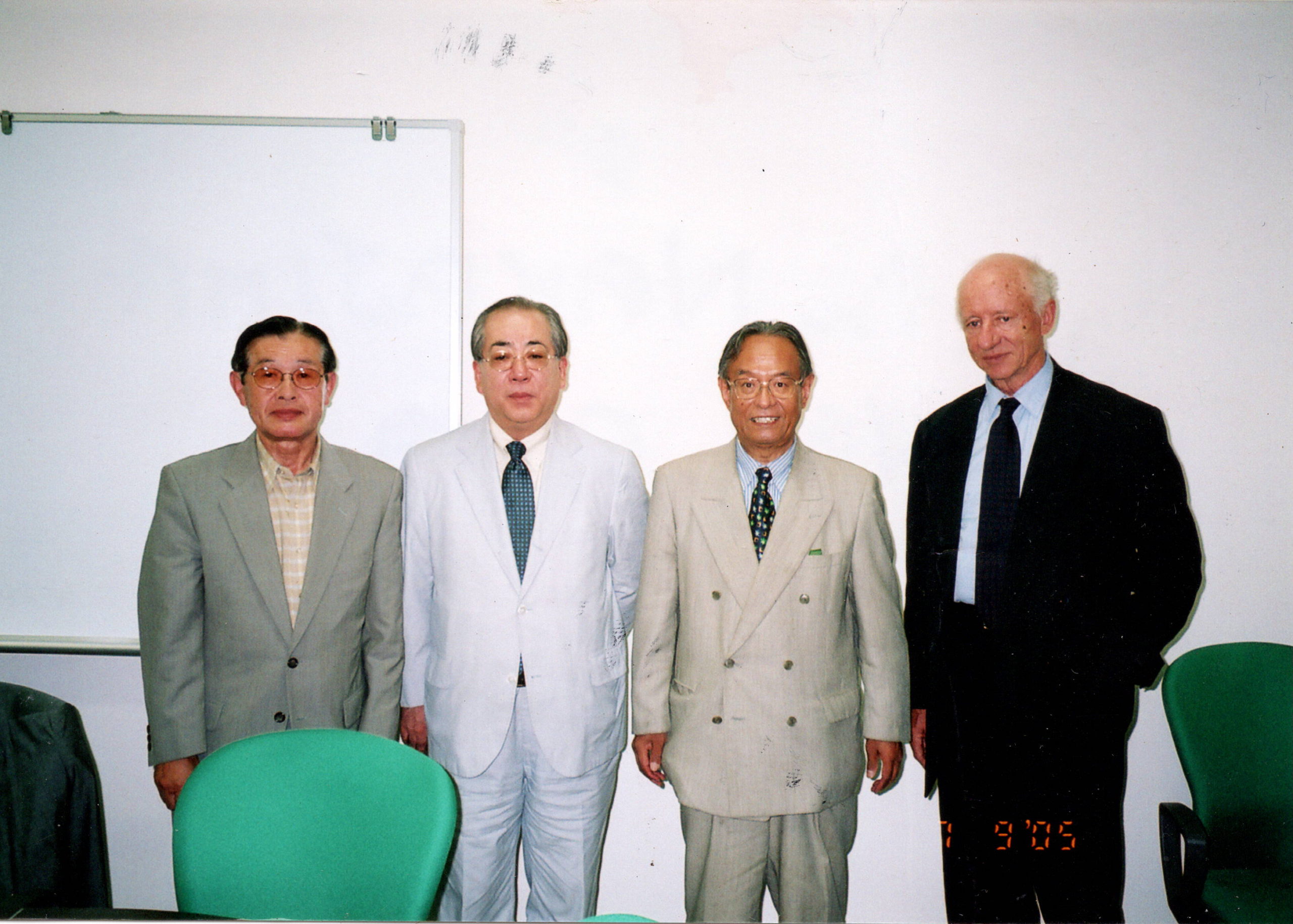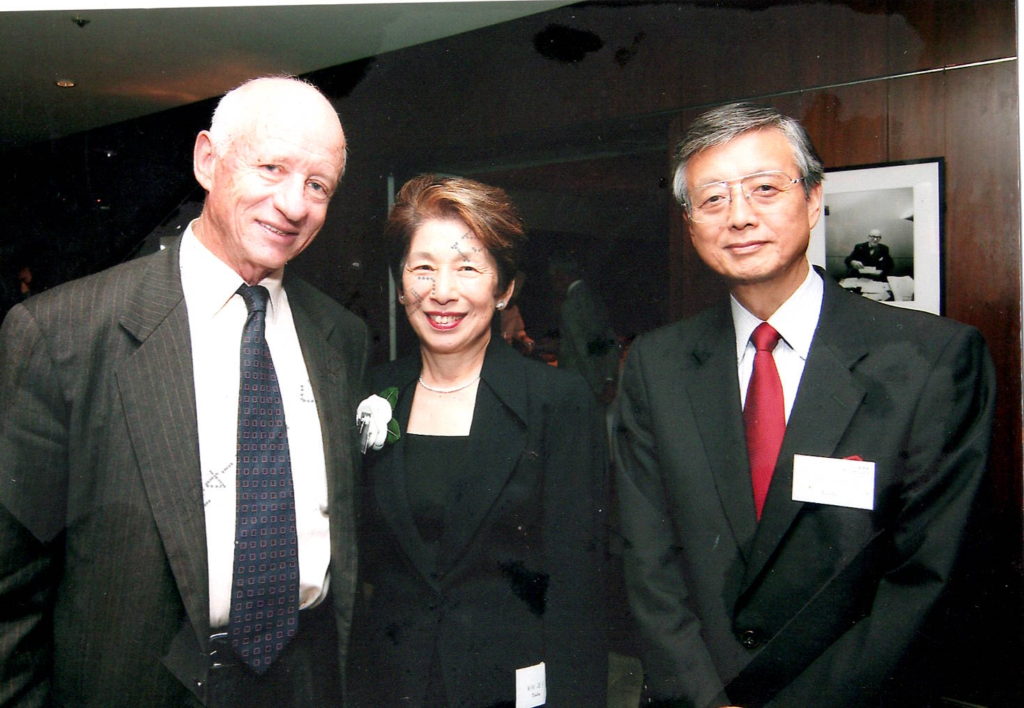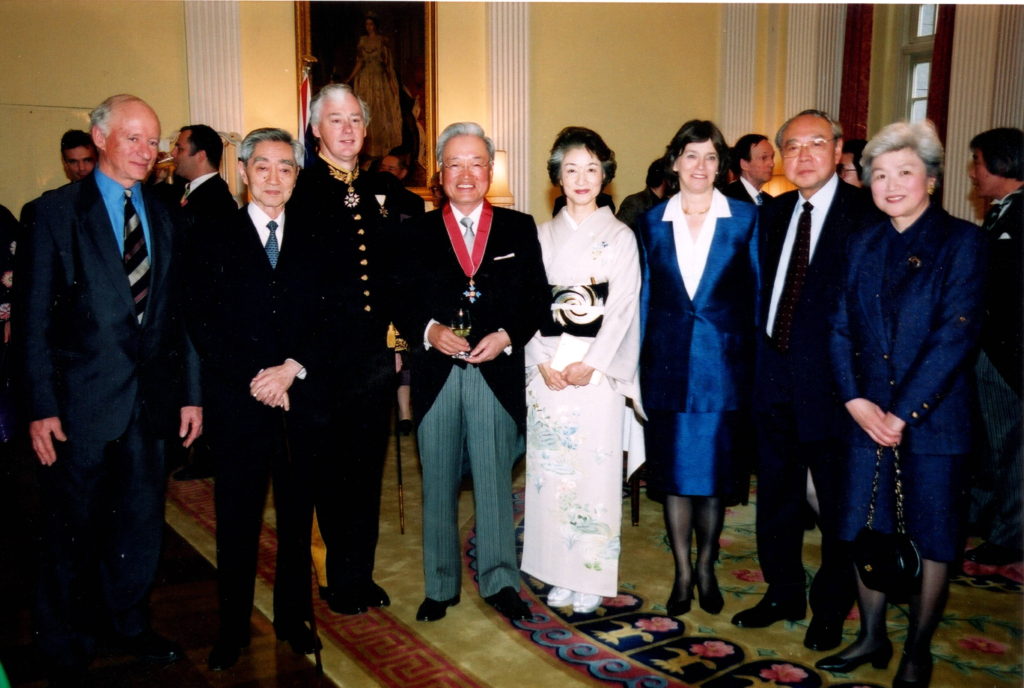Chapter 70 – Vice -President. Akita International University
BETWEEN FOUR WORLDS: CHINA, RUSSIA, JAPAN AND AUSTRALIA;
BETWEEN FOUR CAREERS and FOUR LANGUAGES
Opening an all-English University, in Japan
1. The Initial Request – Vice-President
2. Nakajima Mineo
3. Akita International University
4. Problems and Praises
5. Another Career Change?
6. The Ark Hills Club
With the children graduated and the lecture circuit out of the way, I was finally free.
But then out of the blue…
Someone I had not seen for some years – the former president of Tokyo Foreign Languages University (Gaidai) and well-known China scholar, Nakajima Mineo – was asking me to join a committee for establishing a new university in Akita.
It was to be on the campus which Minnesota State had built some years earlier, in a bid recruit students for its own State universities.
Their Akita campus had provided a two year preparatory course in advance of going to the US for further study. (Quite a few other US states and universities had set up similar operations during the heady seventies and eighties.)
But with the fading of the kokusaika (internationalisation) boom and the collapse of the Bubble economy, almost all had pulled out.
Minnesota lasted longer than most, but eventually it too succumbed.
1. The Initial Request – Vice-President
With help from Akita prefecture authorities, Nakajima hoped he could take over the empty campus buildings to set up a regular four year university where the entire education would be in English, including during a one compulsory year abroad.
Unlike the US universities who had set up branches in Japan, he would provide a full degree with accreditation from the education bureaucrats.
Would I join the committee, please?
…
I said yes, tentatively.
(It would have been hard to say no since I was, after all, claiming to have a strong interest in language education in Japan.)
Before long, however, the request had become – would I agree to be the vice-president of the university he planned to establish.
This time I tried to say no, but ended up saying yes.
2. Nakajima Mineo
My connection with Nakajima was curious.
He was well-known as an anti-Beijing conservative activist, enjoying good ties with the Japanese rightwing, the Sankei and Yomiuri media stables especially.
That would normally have been a good reason not to want to get too involved with his new university.
But he was also a China scholar of some repute, even if in recent years he had joined the rightwing clamour predicting China’s impending economic collapse, and the need to rescue Taiwan from Beijing’s clutches.
Many years earlier he had suddenly rung me out of the blue, saying he had just read my chapter on the Sino-Soviet dispute in the Japanese translation of my ‘In Fear of China’ book.
He congratulated me on my research, saying that no other China-watcher had worked so hard to discover the true origin of the dispute, namely the 1958 Taiwan Straits crisis and the Soviet cancellation of its nuclear assistance promise.
Could we meet and talk about it?

(I should add that to this date, and apart from one or two Chinese scholars, no one else has appreciated the work and research I put into that chapter, or the way the mistaken version of the dispute led indirectly to the tragedy of Vietnam.)
Soon after he had asked me to join the Gaidai shimon kaigi (advisory council) for his university, where I discovered the factionalism that was harming the university and encouraging him to establish a new university, without factions.
—-
But while I appreciated the past attention, now he wanted me to become the vice-president of a university in distant snowy Akita when all I wanted to do was to start to enjoy my new life.
I could accept but only on the condition I could remain Tokyo based, and commute. Akita was too cold and distant.
I could hardly expect the normal vice-presidential salary on that commuting basis.
But as with Tama, I was promised a fairly easy advisory and titular role, with only some teaching, and a salary appropriate.
Eventually I agreed, mainly out of curiosity to see how the experiment would turn out.
I also managed to invent a rather uninspiring English name for the new university – Akita International University or AIU. (In Japanese it was Kokusai Kyoyo Daigaku –literally, International Liberal Arts University)
(I should have stayed with the translation for the Japanese name; there are far too many ‘International Universities’ in Japan.
(And that translated name would have made clear we did not teach science, math etc.)
3. Akita International University
As an experiment in the power of publicity and novelty to attract quality students when student numbers are declining, AIU had been an outstanding success.
But as an experiment in turning out fluent English speakers equipped with the education needed to function on the world stage, the university still had some way to go.
I got almost nowhere trying to persuade our PhD saturated English-language teaching division that language teaching should focus on concentrated listening to content-filled materials, rather than lectures on English grammar and composition.
On the other hand I never suffered from the fact that politically Nakajima and myself were poles apart. On the contrary, he was later to defend me from rightwing attack.
He remained deeply critical of Beijing, even as it was obvious that China had become a key player in world economy and politics. He was also part of the move for a revival of Bushido values to save Japan.
But we related to each other, with respect for each others’ professional qualities.
When it came to manoeuvring through Tokyo’s education politics and bureaucracy, and establishing links with foreign universities, he was expert.
Which was why he had been able to set up his radically new university.
He was also unfailingly polite and helpful.
Which was why my rather artificial relationship with the new university had managed to survive.

4. Problems and Praises
AIU demands were reasonable – give some courses, attend management conferences, welcome visitors.
The courses were generally uninspiring (as most undergraduate courses in Japanese universities tend to be). The air travel and overnight hotel stays were unpleasant. So too was the cold, raw atmosphere of a brand-new university in Japan’s far north.
Personnel squabbles were draining. Some faculty member choices were unduly hurried. And Nakajima’s aversion to the China only a few miles away from us across the Japan Sea was a blot on our claimed internationalism.
But the quality of some students, drawn from all Japan thanks to the publicity Nakajima had gained for his experiment in international education, was exceptional.
And because it was almost the only university in Japan with all teaching in English it was able to attract good foreign students.
A further merit was that the university required all students to live in campus dormitories, ideally with each Japanese student sharing a room with a foreign student.
One result was that in the Times higher education rankings for Japanese universities AIU was later to be chosen #1 in Japan for student environment as well as engagement.
…
But as always in Japan, even more than elsewhere, a successful idea immediately attracts imitators.
A faculty with all teaching in English has since become standard in many better universities. Some have even shamelessly copied the same names as we used for our faculties and departments.
But setting up a new university had been an enormous strain on Nakajima, which may have contributed to his relatively early death (he was the same age as myself).
His successors could not quite inject the same enthusiasm.
5. Another Career Change?
Visits to China to recruit partner universities had opened my eyes, again, to the dynamism and progress of the new China – so very different from the Cultural Revolution chaos and backwardness I had seen only a few decades earlier.
Returning to Japan with its negativism, its struggling economy, its apathetic students and its backward politics was sad. And as at so many other universities the contrast between the study eagerness of the Chinese students and the laziness of many of the Japanese was appalling.
So much so, that in our English language courses it became standard to try to inject some Chinese students so the example of their eagerness and success would motivate the Japanese students.
…
As my time at AIU began to run down I was still looking for new horizons. I was still only in my late seventies, and it is true what they say: better doctors, better diet and healthier environment do combine to allow the human being live and work much longer than before.
I had the option of trying to get back into the Japanese guru circuit.
But once black-listed, in Japan means forever black-listed.
Besides, with one’s own website and writing outlets who needs to run around the nation just to talk to a few hundred lecture listeners at a time.
I had an open invitation (from Tajima, an old friend from Hong Kong days) to join the classy club for foreign ministry types, ambassadors etc. just up the street from my Tokyo office and next to the Spanish embassy.
But I feared I would be blackballed for past criticisms of Japan’s foreign policy and declined the invitation – but probably foolishly in retrospect (I needed that sort of company, and they also offered free parking).
6. Ark Hills Club
I could have worked harder in the several other outfits which still accepted my company. One was the Ark Hills Club where I had been made founding member by Mori Minori – a major land and building developer in Tokyo.
It was the gathering place and watering hole for the Tokyo elite. Together with its heated swimming pool, gyn etc., it was also just three minutes walking from the neat apartment Mori’s company had provided me at moderate rent.
Mori had placed the club in a high-rise complex he had built on the site of a bunch of old two storey shops and houses that had somehow survived near central Tokyo.
I had to respect his ability to move all the inhabitants out, something very difficult to do in Japan.
Mori also felt I had something to say about urban development and put me on one of his committees.
There I had said mid-rise housing (around 4-5 stories) was preferable to high-rise monsters.
Today his high-rise monsters dot the Tokyo horizon.
…
Maybe he was right.
But at time of writing I still stay in the apartment he had generously provided in a mid-size apartment block.
